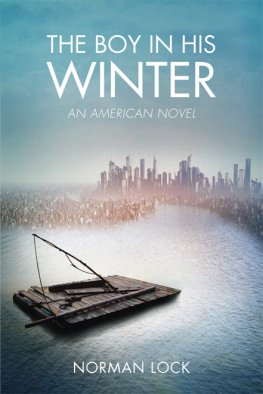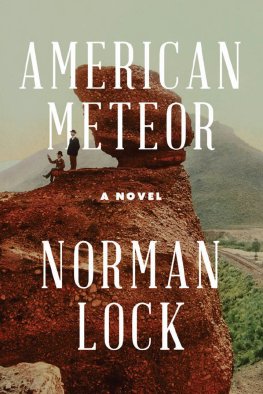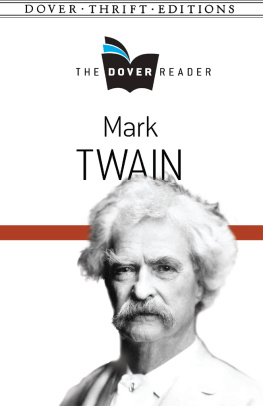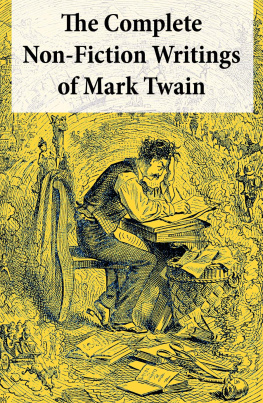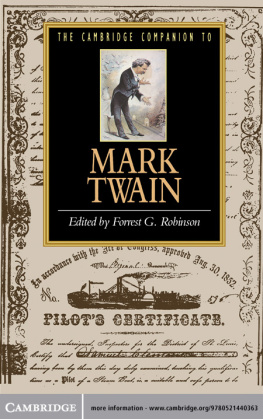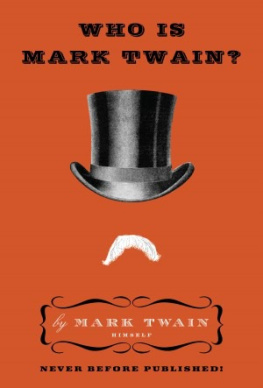Norman Lock
The Boy in His Winter
To my grandsons, Max and Drew, and for my father, a sailor who has lit out for the Territory
I reckon I got to light out for the Territory. .
The Adventures of Huckleberry Finn
PART ONE. July 2, 1835August 29, 2005
I LOOK BACK IN MY OLD AGE on that long-ago day when I came off the river and began my grown-up life and much earlier still, when, no more than a boy, I set out from Hannibal on the raft with Jim. Of course, I reckon time differently now than we did then, sweeping down the Mississippi toward Mexico as though in a dream. Those days did seem like a dream, though not mine, or Jims, either, but one belonging to somebody whose hand I almost felt, prodding me onward in spite of my reluctance. Or maybe it was just the river I sensed, shaping a kind of destiny for me and also for Jim, whose end came before mine and was, sadly, neither glorious nor kind. We were, each of us in his own way, looking for something that did not exist.
That other story, Jims and mine, about a trip downriver, was true enough. But this, the one I am about to tell, is just as true and even more amazing.
You want to know what I mean by true enough?
I mean that regardless of how things might have been exaggerated in the telling, how far the truth got stretchedyou could always find in the world the same sort of perversity that was set down in his book, only the reality is not so entertaining or picturesque. What I hope to tell if I can find the words and can bear the sometimes bitter recollection is terrible: an abomination dragged up from the minds reeking bottom like a dead woman asleep inside the closed petals of her sodden skirts. I saw that after the wreck of the Sultana, whose charred flotsam glided down the somber river like so many smashed front porches. Mine will not be painted in the garish colors of the book that preceded it by nearly two hundred years.
Whose book?
Mark Twains, of course. Who else besides him (and now me) has bothered about the fate of two outcasts and runaways: one a thief, the other a slave, both determined to put a thousand miles of river water between themselves and righteousness? We wanted only our freedom. We saw it in different lights, but thats all we wanted. To take the cramp out of existence, to lift our heads above our galled necks and tell all those who said no at every turn to go to hell or to blazes, as Tom Sawyer would have said, whose language was more refined than my crude midwestern vernacular, which, in the years since then, I have smoothed out like a wrinkled pair of pants after the hot iron has done its work.
What? You want to know why the story I have to tell is more amazing?
Because it not only happened on the Mississippi River between Hannibal (Twain called it St. Petersburg) and the Gulf of Mexico, along with other of the worlds liquid places, but also in time an unnatural span of it that ordinary mortals cannot hope to cross in a lifetime, or even two.
Youd be wrong to dismiss my book as just another time-travel adventure. While time travel comes into it, the real story, as far as Im concerned, is what happened to Jim, which wasnt in the least adventurous. No, it was a dirty, stinking horror a tragedy, if you like the word that gave me nightmares and disgust for my kind (insofar as I and the rest of what walks on two legs are related by common blood chemistry and a more or less similar shape). I would much prefer having missed it, would rather I had never made the acquaintance of Jim, who was always a friend and who never meant anyone harm. But Ill tell you this: if not Jim, then somebody else. If not a black man, then a person of another color, sex, or affiliation deserving our hatred. Human sacrifice didnt end with the Aztecs, and our civilization has its bloody altar stone buried under a heap of flowers. Enough of that; I dont mean to preach or make my story a moral lesson for Sunday school.
If you were as old as I am and a Christian, as I was, kind of, long ago in Hannibal, youd likely have sung this: Be they yellow, black, or white, / All are precious in His sight, / Jesus loves the little children of the world. It didnt seem right to Tom Sawyer that Injuns, as we called them in our childishness, or Martians, whose complexions we understood also to be red, should have been excluded from the attentions of our Savior. I tended to agree with Tom, though at the time I had no feeling one way or another about Martians. Not long ago, I sat in church in Hannibal and listened while the children lifted their shrill voices in the old hymn and, for the first time, heard it as written: Red and yellow, black and white, / All are precious in His sight, et cetera. I suppose in the 1830s, we must have hated Indians even more than blacks, to have left them out of our caterwauling. I wonder if the congregation would have opened its hearts in 2070 to men from Mars, although Im certain Tom would have, were he still with us. But I swear, there will be no more delving into religion or morality. Not if I can help it not even if the world should cry out for it and you, reader, grow indignant to hear what certain people consider to be pleasant and amusing pastimes.
Twain hinted at the darkness. Im just bringing to the surface what was waiting to show itself. Like the woman raised by corruption from the river bottom. Or the light-struck glass plate I saw blooming in the photographers developer bath at Vicksburg.
You want to know how an unschooled river rat of a boy came to write as if hed swallowed, whole, Mr. Webster, Mr. Strunk, and Mr. White?
Something of my mythic life must have clung to me after I had left the raft for good. It fitted me, like a keel to a riverboat, for the life I would lead later on as an ordinary man. Ill tell about that in its proper place and time: after Id concluded my boyish days on the Mississippi, without poor Jim, who was cut down in his prime.
On the river, Id gotten hold of the truth. At least part of it. So I believed. Maybe I was wrong. Maybe what I took to be the truth the bitter pill of it was just something in my mind. . something I made up. It happened long ago, and I may be only an old man saying whatever comes into his head, as old people will. Maybe it happened the way Twain wrote it, and there was no other journey but his. But then how do you account for what happened to Jim or, much later, my brief and infamous apprenticeship as a dope smuggler and my equally dubious career selling yachts? As I grew older, I found I had a gift for salesmanship, which is, after all, one of the American arts.
I said that what I had to tell was a horror. But not entirely and not always. Funny things happened to Jim and me, the way they do to all of us. Funny and strange. Ill try to recollect them and try not to let my tune sour. Even small disasters can darken the minds lucidity, as though the world were seen through a drizzle of dust. Its easy to think of the world as a dirty place unfit for human habitation after youve been in it for as long as I.
ON THE JULY AFTERNOON IN 1835 when Jim and I set out from Hannibal, we had no more idea of heading for Mexico than flying to the moon in a rocket ship like the one I saw shot from a cannon, at a nickelodeon in Baton Rouge, which ended up in the moons eye. I ought not to have said set out, for we had no other destination in mind that afternoon than a willow tree drooping over the river as if in sympathy with a universal languor. The heat was fierce. Not the shiftless idlers the good citizens of Hannibal supposed, Jim and I had intended to improve the time by fishing for yellow perch shy, like us, of the brazen sun. They appeared to be asleep beside a sunken log, pale shadows unmoving on the copper bottom. I know of no more pleasant occupation than to loll peaceably on a raft, one eye drowsing in the latticed shade of a disreputable-looking hat fragrant with straw and sweat, the other watchful for the least submarine disturbance. With blunt fingers, Jim undid a knot of worms from the moist secrecy of a dirt-filled tin can and, separating a fat one from its congregation, set it writhing on a hook. I listened contently as a lead sinker carried the worm down a slant of weakening sunlight toward the perch.

